
About the Author: Catherine Chan Wai Tung is a university supporting staff. She has a speech disfluency since childhood. She began to accept the gift of stuttering after becoming Christian and with the help of Avoidance Reduction Therapy. She is a co-chair of the Hong Kong Stuttering Support Group. She loves animals, contemporary art, modern architecture and jazz music, etc. She enjoys visiting museums, sharing stories from people, collecting postcards, playing piano, reading non-fictions, as well as taking snapshots when travelling local and abroad. |
Hello everyone in the international stuttering community, it is my great pleasure to participate in the ISAD online conference for the first time. This year’s theme “Being Seen, Being Heard – Representation and normalization of stuttering in the mainstream” echoes my intention of making this illustration book. As persons who stutter, we would like to be understood for the struggles and challenges that we are getting through. By dissolving those assumptions brought by misconceptions towards stuttering, we can better integrate into mainstream society.
These rough drawings are work of a narrative therapy workshop I joined in 2021, which is a personal reflection of living with stuttering from childhood to present days. The text content is presented in bilingual, i.e. Chinese (with Cantonese expression) and English. I have presented it on several informal occasions including a session with the Taiwan Stuttering Association. I wish this short story could bring you joy, and personally inspire some of you to create your own!
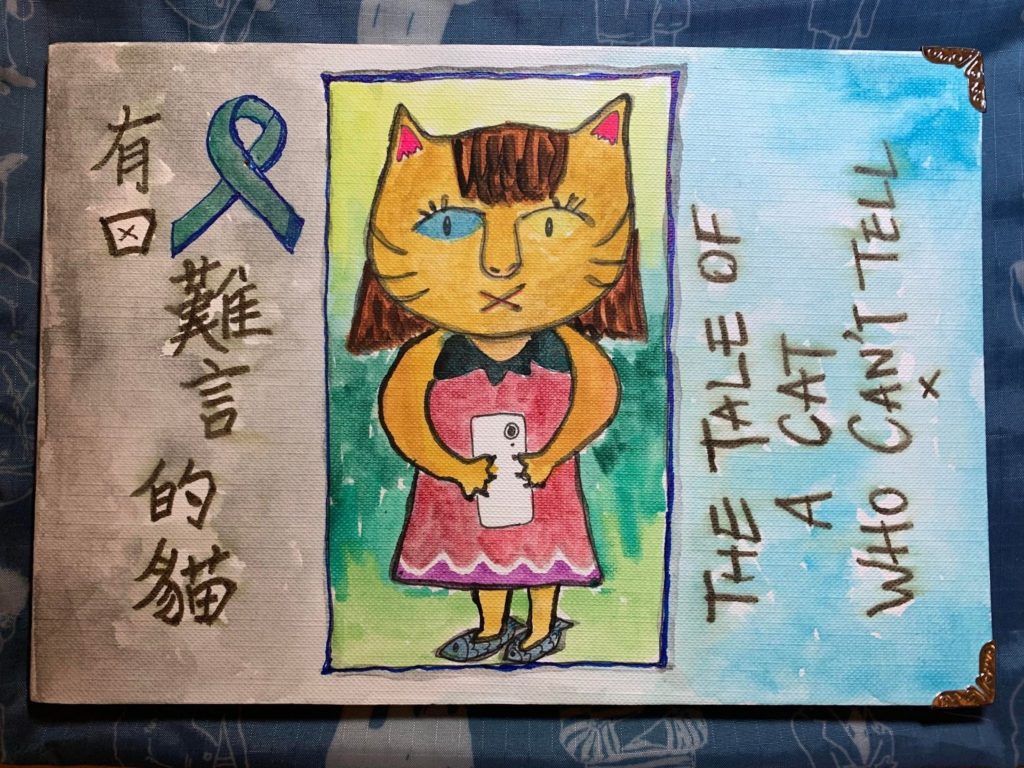
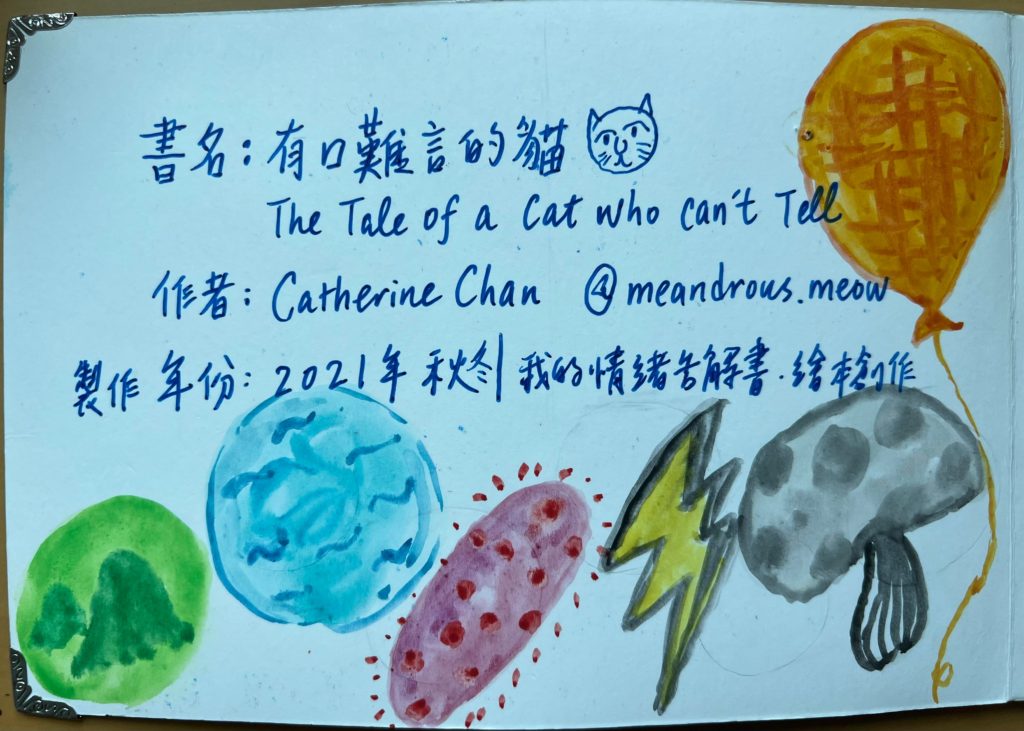
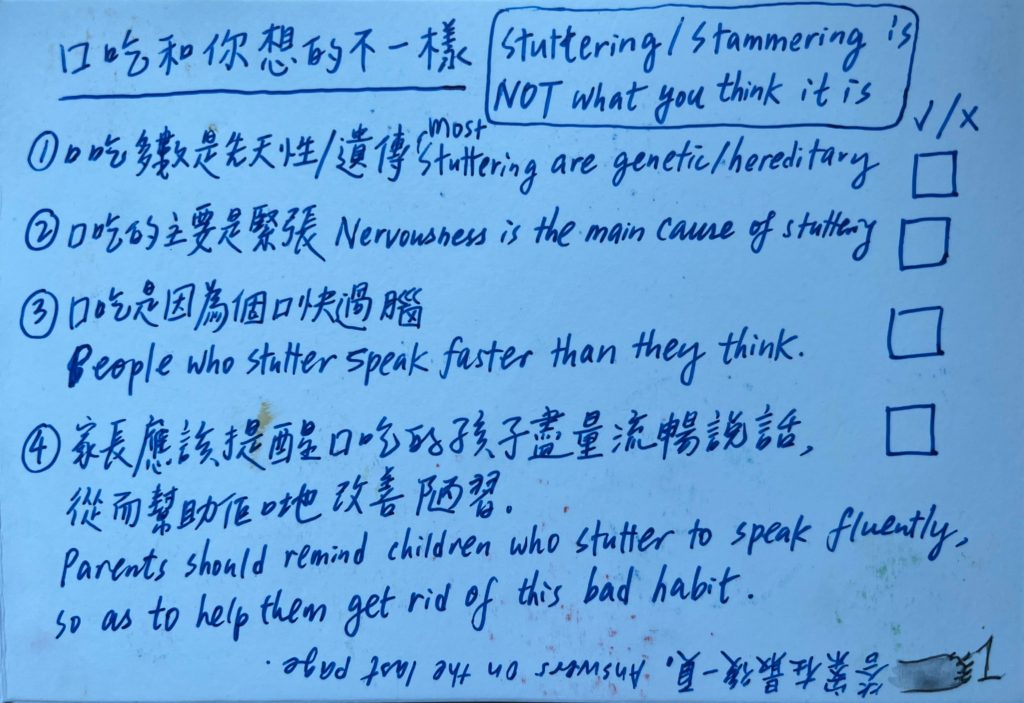
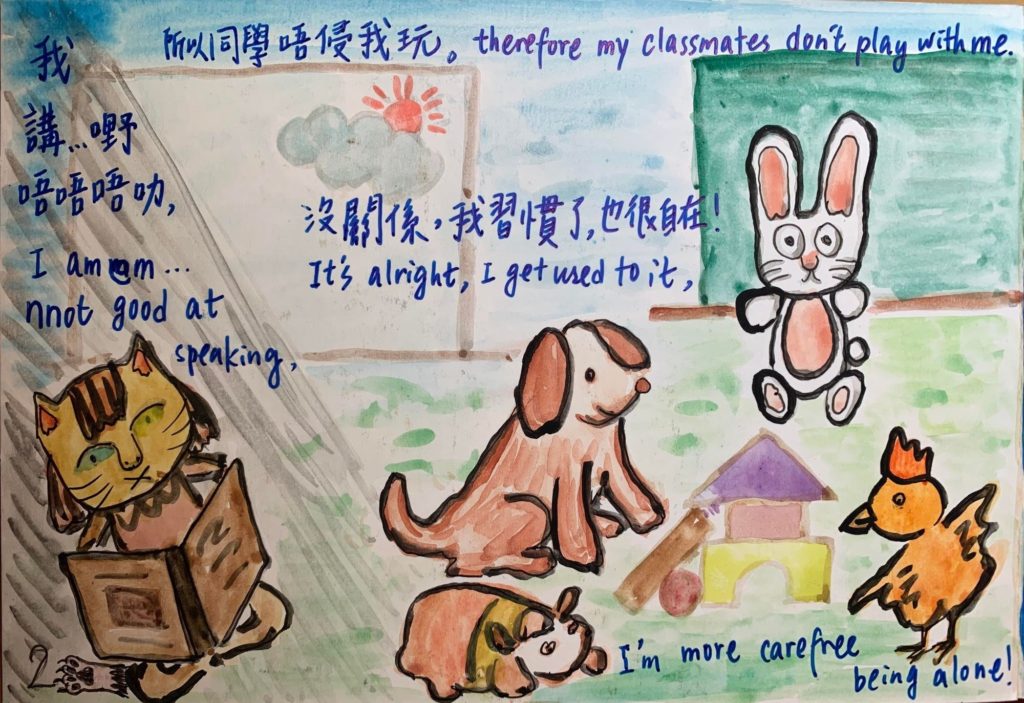
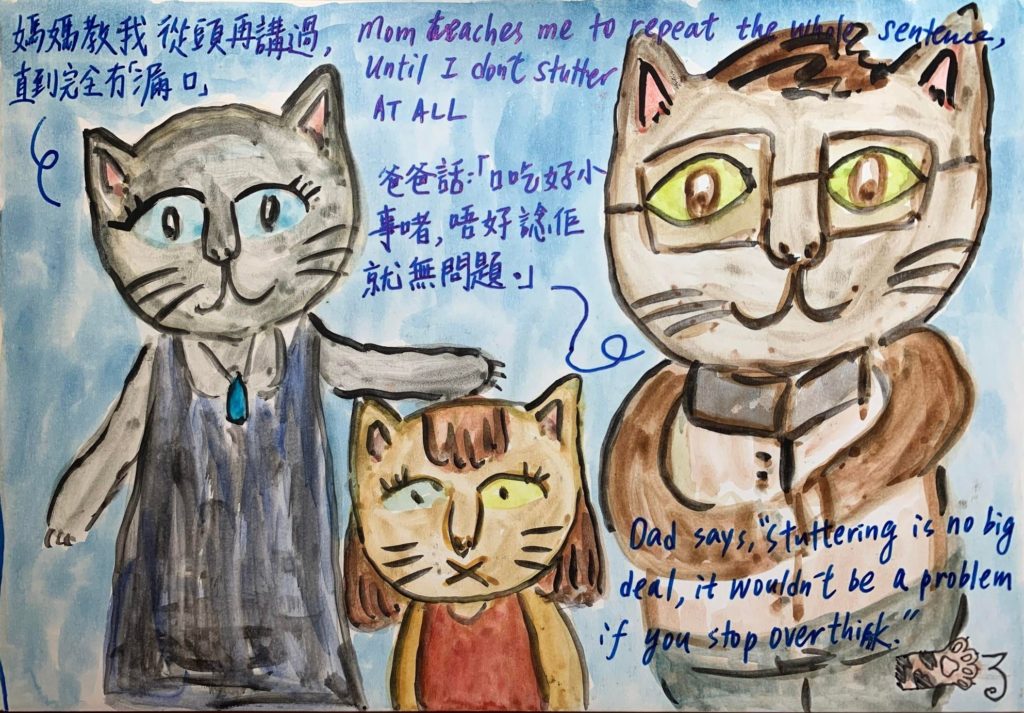
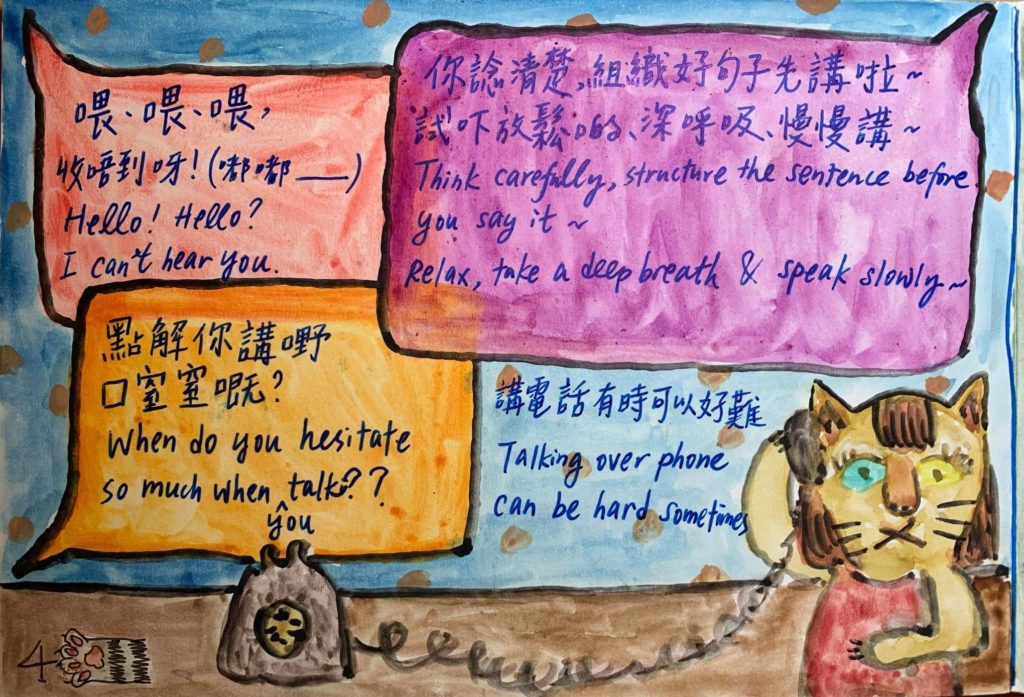
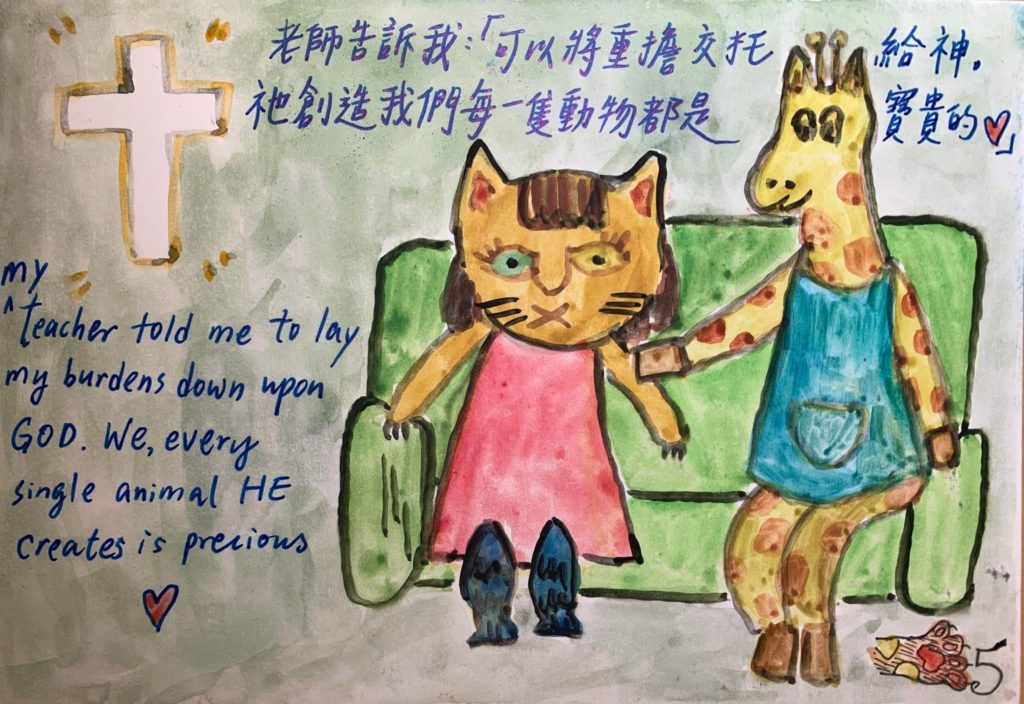
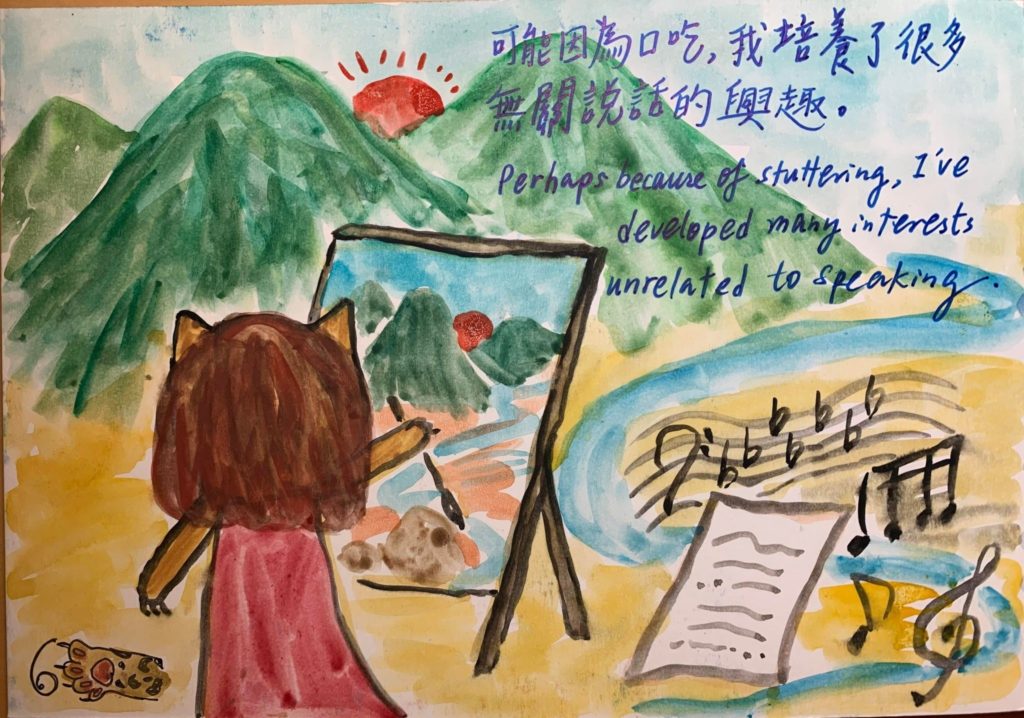
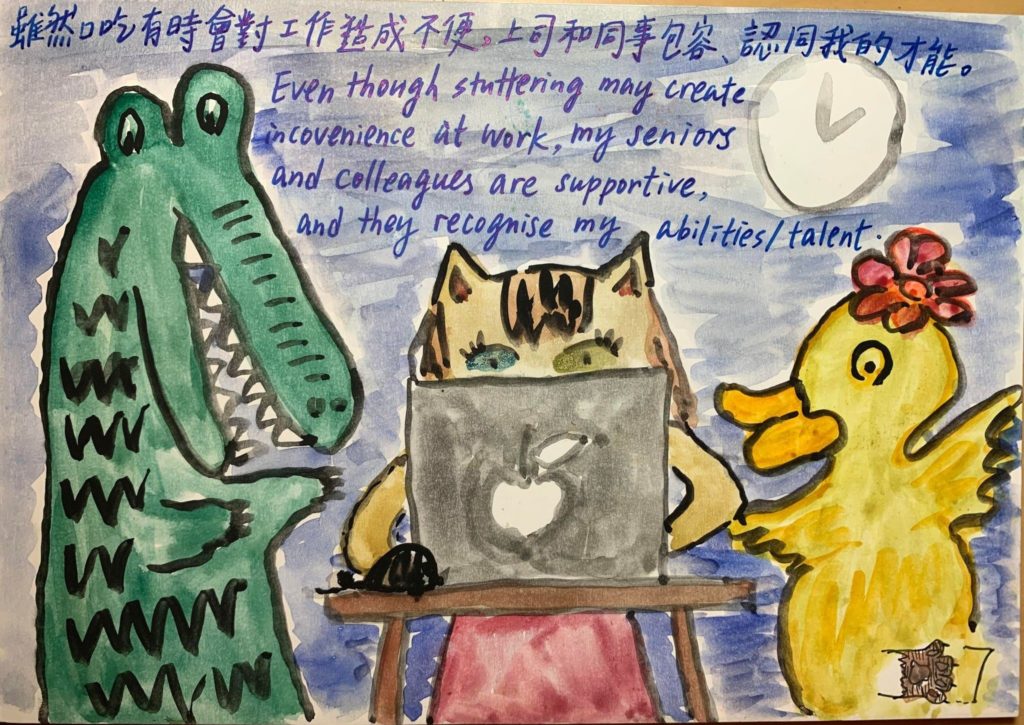
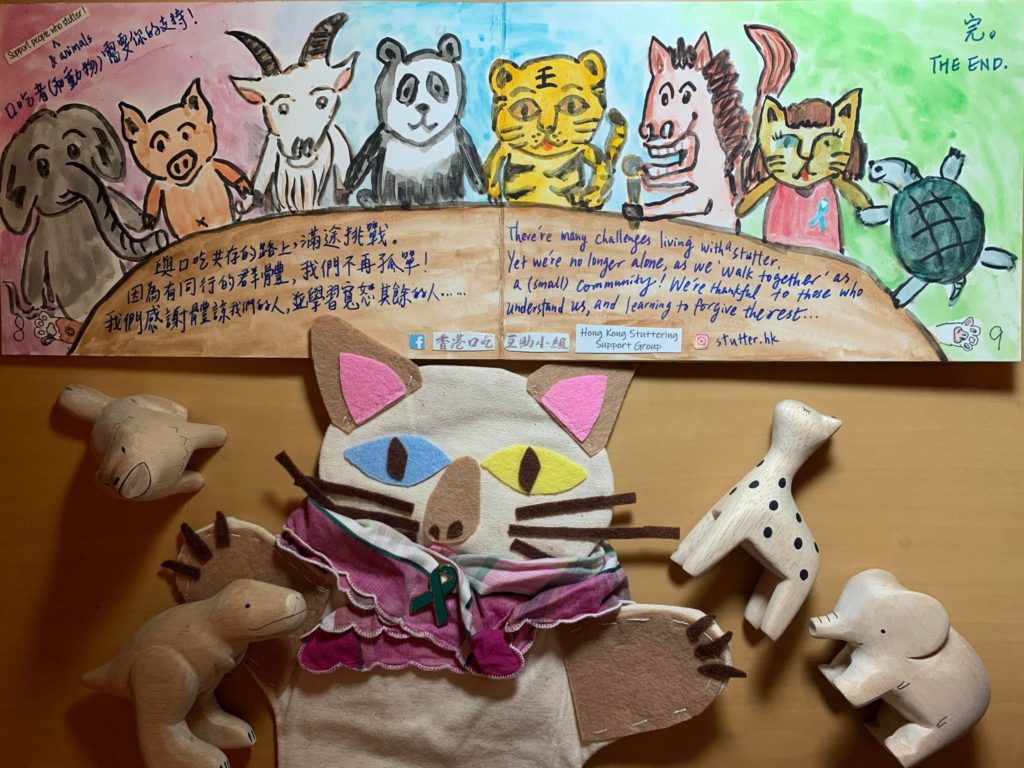
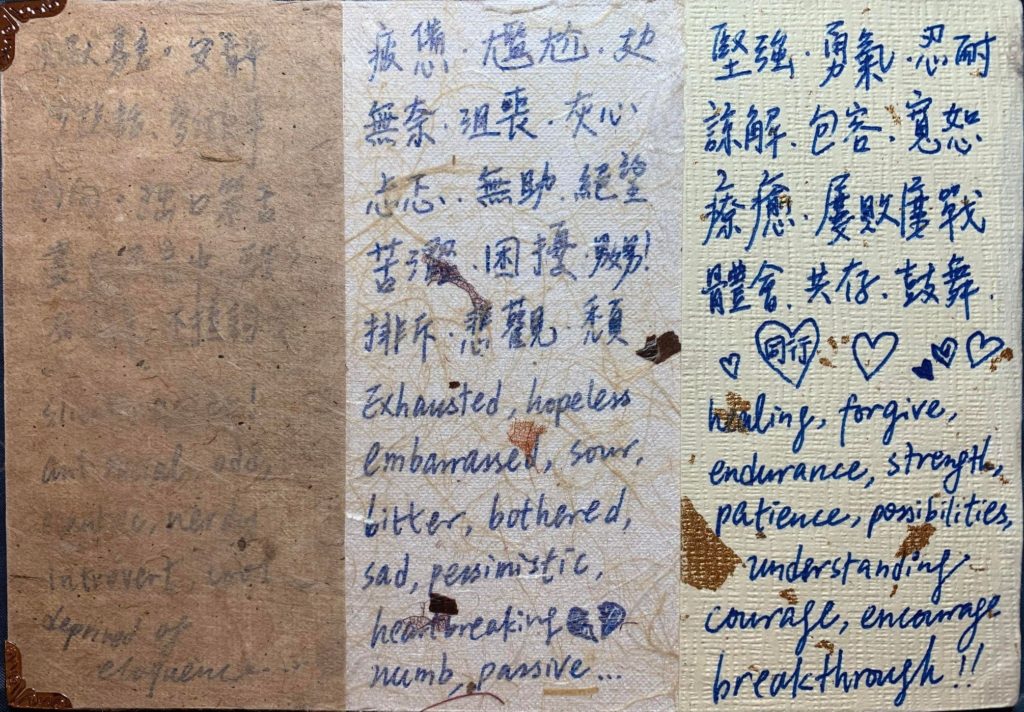
![]()

Catherine, thank you so much for sharing your lovely and charming story book. It seems that you’ve found a beautiful, creative outlet and something you can share with others, especially children to put them at ease. I also found it interesting that you have so many hobbies that you say you developed as a result of stuttering. Thank you again for the joy you added to my day!
Dear Mary, thanks for your kind words 🙂 If I have the chance to meet kids who stutter, I’d like to give them warm hugs and encouragement that I wish to receive when I was their age.
Catherine, I love how you expressed yourself with drawings. I love cats too by the way!
I am glad this is therapeutic for you.
~ Adriana
Hi Adriana, glad you like my drawings. With cats, we connect!
Hi Catherine, I truly loved your drawings and reading your story. I was wondering if you would be willing to provide more of your illustrations I would love to read them?
Dear Arose, thanks for your accomplishments. I learned Chinese landscape painting when I was younger, and I did some random sketches back then, but not directly related to stuttering. This was actually the first time I made a picture book. As an amateur art enthusiast, I would like to explore more on illustrations too, when I have such space and time…
Hi Catherine!
Thank you so much for sharing your drawings and story with us! This is such a great way to connect with others and help them get an insight of your experiences. I am a graduate student in speech-language pathology, and I find it so helpful to hear the experiences of people who stutter in order to better understand their struggles with stuttering!
What has been your greatest help in accepting your stutter?
Dear Eliaep, nice to hear about your passion for understanding PWS. The turning point in accepting my own stuttering was perhaps being introduced to “avoidance reduction therapy”, since then I realise that the harder I tried to suppress/ hide it, the more it manifests. Besides, there are some supportive people around, who accept or even “embrace” my stuttering, even before I can truly do it!
Hi Catherine!
I really liked your drawings. Art can be such a great medium for expressing your thoughts and feelings to the world. I found it very interesting that you developed many hobbies related to speaking. I was never good at public speaking as a kid but I started taking public speech classes in High School and fell in love with the class!
Thank you for sharing,
Megan
Dear Megan, thanks for your warm message. It was so great that you eventually enjoy public speaking, I only feel at ease when I speak about topics that I’m familiar and/ or interested in. My hobbies, especially in the early days, were mostly unrelated to speaking (singing traditional Cantonese opera shouldn’t be counted). Even today, I still struggle in job interviews, but sometimes I may confest to the interviewers that I am a PWS.
Hello, Catherine!
I appreciate you sharing your artwork and narrative with us. This is such a wonderful way to interact with others and give them a glimpse into your adventures. As an undergraduate student studying speech-language pathology, it really helps me to comprehend the problems that stutterers face by hearing about their experiences. My question to you is what has helped you the most to accept your stuttering besides avoidance reduction therapy? Did you find anything else that you believe contributed to embracing your stutter alongside therapy?
Thanks so much!
Valerie
Dear Valerie, thanks for your appreciation and thoughtful question. In fact, throughout my life, I only received therapy for less than 3 years (different approaches and duration). In the early stage, I did fluency sharping as a research subject, which helped me thru a very severe period. Overall, I do believe speech therapy is not the only way out. In my drawing, I mentioned the religious faith in Christianity. Reading the bible and being accepted by others build my sense of self-worth. From my experience, self-disclosure usually results in more understanding. Not sure if I answer this well 😛
Hello Catherine I really enjoyed looking at your drawings and story I showed my children and they really liked them. They even asked questions and made comments like I did not know people that stuttered felt that way… thank you for sharing this.
Janet
Dear Janet, I’m overjoyed to know that you shared my story with your children and they enjoyed it. I do not have the chance yet to tell it in front of children, but I definitely wish to try it. My friends think I’m “young at heart”, so children enjoy playing with me, and I feel at ease being with them. Are you PWS?
Hi Catherine!
Your art is beautiful! I love cats and have had some as pets throughout my life. I enjoy going to museums and reading as well! Do you have any favorite books? I feel like that’s one of the most challenging questions I’ve faced trying to pick just one favorite book. What initially made you start creating art? Are there any particular artists you like or draw inspiration from?
Dear Spring Rose, I’m pleased to answer your questions. Your reply reminds me of my experience on Postcrossing (an international postcard exchange online platform), where we may connect with people who shared similar hobbies from other parts of the world. These days I usually read non-fiction in Chinese. For English books, my all-time favorite is Maltida by Roald Dahl. I recognized myself as this little girl who was misunderstood in childhood. Books were my best companion, and I also met a few caring teachers in primary and high school, who were comparable to Miss Honey.
This also answered your last question, I love Quentin Blake, though I didn’t use his style this time. There is another illustrator I like, from Hong Kong called Joanne Liu, for her colorful style and heartwarming messages. My journey in visual art started with Chinese landscape painting, which I learned for a decade during my teenage. There’s a long list of artists I appreciate, e.g. Edward Hopper, Xu Bing, Stephen Wong Chun Hei etc.
Hi Catherine! I enjoy all your art. It is beautiful what you have created, and the ability to express feelings in art is such a gift. I admire it. I wanted to ask you, what is avoidance reduction therapy and is it different than speech therapy.
Dear Brian, thanks for reading my story and comments. I am quite a beginner at A.R.T. to answer your question. In my experience, rather than reducing stuttering through practicing techniques, it is more about awareness of my own secondary behaviors developed when I try to suppress/ avoid stuttering, trying to reduce those. I also heard about voluntary stuttering, but I haven’t tried that yet. By promoting self-acceptance, it tackles the psychological aspect of stuttering.
Hi Catherine, your artwork is beautiful! This can inspire students to express themselves in a different way. My question for you is, in what other ways would you like to bring more representation to the media? I am in my undergrad studying to become an SLP, and would like to your input on how to support future clients. Thank you!
Dear Justin, thanks for the thoughtful question that I may not comprehensively address. With many people’s efforts, the awareness of stuttering is rising globally, perhaps at a slower pace in Asian regions e.g. Hong Kong. One obvious example I can think of is that, I hope the media don’t make fun of PWS as I saw in TV dramas. Over the long way toward the normalization of stuttering in mainstream society, every small step counts.
Hi! I loved looking at your art work. I love art and seeing you create this beautiful piece art. What do you think people can do to help spread awareness about stuttering?
Thanks for your comment and question. My support group also discussed future plans in promoting stuttering awareness, e.g. making documentary videos, conducting sharing sessions in schools, and collecting stories of PWS. Before we have the resources and abilities to do all these, now we are gathering PWS through online and F2F meetings.
Hi Catherine! I loved looking at your art work. I love art and seeing you create this beautiful piece art. What do you think people can do to help spread awareness about stuttering?
Hello Catherine !
Thank you for sharing these drawings! Art is great way to connect with people and this is very intelligible. thank you!!
Michelle Enriquez
Thanks, Michelle 🙂
Hi Catherine!
I absolutely love your illustration book! I think this a wonderful way to connect with others who are experiencing the same thing. I also believe this is an amazing book that children can read and relate to as well! Cats are one of my favorite animals so I truly enjoyed reading your book. Thank you so much for sharing your amazing talent!
-Maria De La Mora
Thanks, Maria <3
Hello Catherine,
Thank you for sharing your story and overall message through art. I thought this was a very creative way to get your message across. I am currently an undergraduate student majoring in communication sciences & disorders. I also work as an instructional aide at an elementary school. I would love to show this to a couple of students that I support at work during our reading time. Is there any other educational books that you can recommend to help students in supporting self-esteem and acceptance of their stutter?
It’s my pleasure if my drawings could bring joy to the children that you are serving.
I don’t have access to the books that you’re looking for, as I only started accepting my stutter after my teenage, and my first language is Chinese. But I find this on Google, hope it helps:
https://www.stutteringtreatment.org/blog/6-great-books-about-stuttering-for-kids
Besides, I heard of a famous comics artist called Daniele Rossi, you may check out his content.
Hi Catherine!
Thank you for sharing your beautiful art and story with us. You have inspired me! I especially enjoyed the part of learning that your colleagues are supportive and recognize the talented person you are! How has this experience of creating this picture book been for you? Look forward to hearing from you!
Best,
Liz
Hi Liz, thanks for your feedback. Special thanks to the friend who put me in this workshop that incorporated meditation and storytelling. It was tough for me at the beginning before ideas come into conception. There’re rough details, such as on some pages I didn’t leave enough space for the text in two languages. Turns out it is an enjoyable experience drawing this little book to retell my stuttering story in a positive light. In the sharing session, the instructor told me she taught a stuttering boy before, whose personality is widely different from mine. She even used my image in the promotion material of the next workshop.
Hi Catherine!
It was a pleasure reading about your background and reading your illustration book! I’m happy to have you here offering your insight through such a creative piece. “Healing, forgive, endurance, strength, patience, possibilities, understanding, courage, encourage, breakthrough!” These are words I will hold onto in my life as a future Speech & Language Pathologist who looks forward to working with people who stutter reach their goals. Keep on your amazing work!
Thank you kindly,
Dominique
Dear Dominique, good observation. Actually, the words on this back cover page symbolized three stages of my relationship with stuttering, from left to right: 1. trying to hide of stutter by staying silent; 2. feeling stressed and helpless during the preparation for public exams, which contain oral tests that my performance was greatly hindered; 3. relieved after a breakthrough of starting to embrace my stutter.
Hi Catherine!
Thank you for sharing with us your wonderful creative story with us. I feel like everyone has their own way of displaying what they feel and this is so well out together. For me, I like to express myself through music and what I listen to. Again thank you so much for sharing your story book.
Best regards,
Anel I.
Dear Anel, I’d like to learn about your music works too. The healing and empowering potentials of art is so amazing.
Hello Catherine, Your post has a warm inspiring vibe. I enjoyed your drawings and loved the harmony in the colors. Art is one of the most powerful tools to display a message to the perceiver. I love the meaning and the message you have behind your drawings. Also,I felt like I had to mention, I love the characters eyes!
-Dana
Dear Dana, you have good eyes~ There is a hidden meaning for the two colored eyes of the main character (i.e. the cat/ myself). My parents have contradicting beliefs, which sometimes made me feel lost and confused, but also thanks to that I am able to look at both sides now.
Hi Catherine! I think that is so great that you have found an outlet like this to help you express your thoughts and feelings. What made you decide to join the narrative therapy workshop? I felt inspired reading your story about how it has helped you reflect on your life long journey. Thank you so much for sharing!
Good question, my intention of joining that workshop is such a coincidence. A passionate friend of mine who held art programs for the elderly enrolled, however, she could not catch the schedule due to a change of working location. As her replacement, I wasn’t sure how much I can gain from this workshop, but it turned out I enjoy it so much!!
Hi Catherine,
Beautiful artwork! This would make a wonderful children’s book to learn about stuttering. I am hoping to one become a speech language pathologist. I was wondering if you ever received speech therapy? And if so, what was the experience like?
Dear Susie, nice to hear from you. I have some experience in therapy, mainly during early adulthood.
1. During my final year in high school, under government referral, I met a friendly SLP, she specialized in neither stuttering nor adult. I also have some trouble pronouncing certain sounds that involve placing my tongue behind my teeth, she used the correction of those as a distraction. She gave me some emotional support, while not directly dealing with my stutter.
2. In university, I participated in a study by Prof Thomas Law at CUHK, which is about using syllable-timed speech to reduce stuttering in Cantonese. The group therapy and techniques reduced my stuttering from moderately severe to mild-moderate, and it was my first time meeting other PWS!
3. Last year I also joined another research by post-graduate students of another institution, in which they used “transcranial direct current stimulation”. The experiment also involved reading passages and short talks, while the improvement is not prominent. Perhaps partly because my stutter is mild now, and only gets severe in particular situations.
Hi Catherine,
Thank you for sharing your short story with us. I enjoyed your drawings and reading the short story reflecting on your childhood and how you are doing today. A short story like this is fantastic and is something I will share with acquittances and individuals who are interested in learning more about stuttering. Also, if this is a rough drawing, I can’t imagine how incredible a final version will look!
Thanks for your delightful comment.
Hi Catherine!
Thank you for sharing your illustration book. It is a creative way of voicing your thoughts of representation and normalization of stuttering in the mainstream. As a aspiring future SLP, I understand the importance of being aware of the struggles and challenges that PWS face. It is my hope that education and awareness of the challenges that PWS face becomes more widely spread across the world in the future. It is my wish that PWS are more highly integrated into society in the future.
SLPs played such an important role in “educating” me about the science of stuttering, encouraging me to run my local support group, and inspiring me with cases of how PWS can find their meaning in life. Actually, I may still struggle on some occasions such as job hunting, but at least I don’t feel lonely anymore.
Hi Catherine,
Thank you so much for sharing your stories. The illustrations are beautiful! I think having a creative outlet that can help inspire and raise awareness about stuttering is amazing!
Hope you have a great day and lots of success with your stories!
-Aminah
Dear Aminah, thanks for your blessings!
Hello Catherine,
I appreciate seeing your story through illustration. It was great to see the text content presented in bilingual as well! I would love to get your input on the following question: What would you tell a parent if their child stutters?
– Stephanie
Hello Stephanie, thanks for your kind response. I would encourage him/ her to learn more about stuttering, to be informed of some basics dos and dont’s, from organisation like ours, or consult SLP if necessary. A more straightforward suggestion is, don’t try to correct “stuttering”, but give the child time to express. Also, affirm emotions brought by stuttering, at the same time walking with your kid on the way towards acceptance.
Thank you for sharing your art! Your images are so charming and colorful. I think the speech world needs more artists. A lot of the educational tools therapists use are outdated and could use more creativity. Would you ever consider publishing your work?
Dear Kimberly, there’re voices that encourage me to publish my work too, but I don’t have the resources yet. After receiving so much feedback here, I might consider refining this by getting inspiration from other similar works in English. An artist friend of mine made zines that are more freestyle when comparing with books.
Hi Catherine,
I am amazed by your artwork and am so happy to hear that you have found productive outlets in the form of art and creative expression. As an aspirig=ng speech-language pathologist, it is also exciting to hear that you found utility in “avoidance reduction therapy”. I would like to ask if you were able to use art in your experiences with speech therapy in addition to avoidance reduction therapy. Additionally, what is one thing you think could have improved your experience in therapy? I would love to better understand how I can help clients who stutter feel empowered in their speech and capabilities as human beings. It is important to me to help contribute to their understanding that stuttering does not define them. Thank you for sharing your experience, and I look forward to hearing back from you.
Thanks for your inquiry. I introduced expressive art tools to my support group, which some people find beneficial as an emotional outlet and self-care. Unfortunately, the SLP who introduced me to A.R.T. is engaged in other duties I’m waiting for an opportunity to continue exploring this approach. I heard from the Taiwan Stuttering Association that they had SLP who was trained in expressive art.
Hi Catherine,
Thank you for sharing your story. I agree with you about spreading awareness about stuttering and the stigma and misconceptions often associated with it. Your drawings and artwork is so cute! Have you ever though about being an illustrator for books?
Thanks,
Tamara
Dear Tamara, it was one of my childhood (day) dreams to become an illustrator. Seems that I am more excited about consuming art than being a producer. Slash is common nowadays, perhaps I could take a more active role in illustration someday.
Hi Catherine,
first off thank you for taking the time to share your illustration book with us. I really enjoyed looking at all the beautiful drawings and reading the story. It made me want a copy to share with my students at school. I work with younger children who are still learning to communicate and thought it would be great to share it with them sometime. There have been other students who make fun of them because they stutter as a result of being shy or nervous, so sharing this story would teach young children to respect one another regardless if they stutter or not.
Dear Jessica, thanks for your effort. being teased in school is a shared experience by PWS. Discrimination still exists in many places, against people with other disabilities as well. As John Lennon said, “You may say I’m a dreamer/ But I’m not the only one”. I believe the society will be more friendly to PWS as we work together!
Hello Catherine,
Thank you for sharing your art with us. I am so grateful an individual’s expressions are never limited, and it is evident in your phenomenal art! I can see how your faith has served as a steadfast beacon and am so grateful you have art to relay the acceptance of stuttering and hope now there is a calmth within you too!
My question to you is:
As a person with stuttering, what is one insight you would like us to understand?
Kindly,
Morgan Kim
Are
Dear Morgan, thanks for your kind words, seems that you have a passion for art too!
I would like to answer your question with the “4 (of the many) gifts of stuttering” I mentioned in the ISAD online meeting held in Taiwan:
1. Vulnerability: willing to share my struggles and weaknesses; being compassionate towards others facing visible/ invisible challenges
2. Patience: I’m a fast speaker; stuttering teaches me to slow down and keep my content concise
3. Uniqueness: I gain peculiar experiences due to stuttering, whether they are positive/ negative/ neutral, I enriched my life story
4. Connection: I have chances to make friends in the local, regional, and global stuttering communities
Hello Catherine,
Thank you so much for sharing a part of your life story with us! I enjoyed looking at your artwork and illustration book. Your post has inspired me to turn my personal experiences or knowledge into artwork!
My question to you is: what is a way to show persons who stutter that I am understanding of your experiences and challenges?
Dear Diana, thanks for your insightful question that I haven’t thought about. I recalled in a Facebook stuttering forum, there was a discussion about the best compliment/ comment received. A popular one is: sb thinks the way we talk is cute. Although I don’t think that, I am happy to meet people who don’t think stuttering is what should be correct/ get rid of. That echoes the “Declaration of the Right to Stutter” that my organisation signed this year… I believe PWS would appreciate the variety of ways you show your empathy. For myself, I would be happy to explain when people wish to learn more about stuttering.